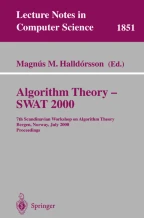Abstract
Pairing heaps are shown to have constant amortized time insert and zero amortized time meld, thus improving the previous O(log n) amortized time bound on these operations. It is also shown that pairing heaps have a distribution sensitive behavior whereby the cost to perform an extract-min on an element x is O(log min(n, k)) where k is the number of heap operations performed since x’s insertion. Fredman has observed that pairing heaps can be used to merge sorted lists of varying sized optimally, within constant factors. Utilizing the distribution sensitive behavior of pairing heap, an alternative method the employs pairing heaps for optimal list merging is derived.
Research supported by NSF grant CCR-9732689.
Access this chapter
Tax calculation will be finalised at checkout
Purchases are for personal use only
Preview
Unable to display preview. Download preview PDF.
References
R. Cole. On the dynamic finger conjecture for splay trees. part ii: The proof. Technical Report Computer Science TR1995-701, New York Univerity, 1995.
R. Cole, B. Mishra, J. Schmidt, and A. Siegel. On the dynamic finger conjecture for splay trees. part i: Splay sorting log n-block sequences. Technical Report Computer Science TR1995-700, New York Univerity, 1995.
M. L. Fredman. Manuscript in preparation.
M. L Fredman. On the efficiency of pairing heaps and related data structures. JACM, 46(4):473–501, 1999.
M. L Fredman. A priority queue transform. In Workshop on Algorithm Engineering, pages 243–257, 1999. LNCS 1668.
M. L. Fredman, R. Sedgewick, D. D. Sleator, and R. E. Tarjan. The pairing heap: A new form of self-adjusting heap. Algorithmica, 1:111–129, 1986.
M. L Fredman and R. E. Tarjan. Fibonacci heaps and their used in improved network optimization algorithms. JACM, 34:596–615, 1987.
Haim Kaplan and Robert E. Tarjan. New heap data structures. Technical Report Computer Science TR-597-99, Princeton University, 1999.
D. D. Sleator and R. E. Tarjan. Self-adjusting binary trees. JACM, 32:652–686, 1985.
D. D. Sleator and R. E. Tarjan. Self-adjusting heaps. SIAM Journal of Computing, 15:52–69, 1986.
J. T. Stasko and J. S. Vitter. Pairing heaps: experiments and analysis. CACM, 15:234–249, 1987.
R. Sundar. Amoritzed Complexity of Data Structures. PhD thesis, New York University, 1991.
R. E. Tarjan. Sequential access in splay trees takes linear time. Combinatorica, 5:367–378, 1985.
Author information
Authors and Affiliations
Rights and permissions
Copyright information
© 2000 Springer-Verlag Berlin Heidelberg
About this paper
Cite this paper
Iacono, J. (2000). Improved Upper Bounds for Pairing Heaps. In: Algorithm Theory - SWAT 2000. SWAT 2000. Lecture Notes in Computer Science, vol 1851. Springer, Berlin, Heidelberg. https://doi.org/10.1007/3-540-44985-X_5
Download citation
DOI: https://doi.org/10.1007/3-540-44985-X_5
Published:
Publisher Name: Springer, Berlin, Heidelberg
Print ISBN: 978-3-540-67690-4
Online ISBN: 978-3-540-44985-0
eBook Packages: Springer Book Archive

